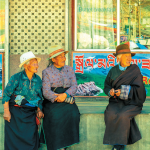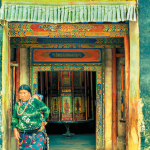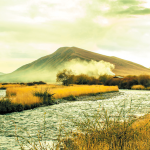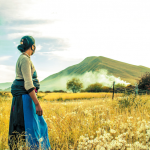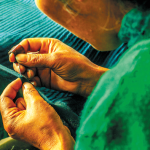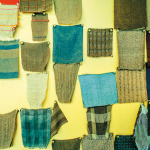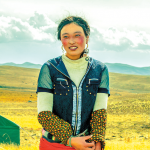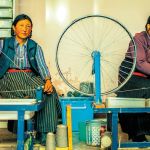On the high pastures of Amdo, towards the western border of China, a small family business is putting Tibetan-made textiles firmly on the luxury map. Introducing the inspiring story of Norlha.
As another cold winter morning dawns, the hum of a dozen sewing machines combines to creates a whirring chorus at the Norlha atelier workshop in Zorge Ritoma, a tiny Tibetan village in the west of China. With smiles on their faces, a group of workers—weavers, spinners and tailors—are comfortably seated at their machines, plying their craft at a furious pace.
For a traveller, the beginning of the route to this village on the Tibetan plateau begins in the middle of China at Lanzhou, an ancient city that served as a stopover point for caravans travelling along the Silk Route. A two-hour flight from Beijing, Lanzhou is the capital of the Gansu province. It’s a city as unsightly as it is polluted, the skyline dominated by towers and factories and the landscape dotted by major arterial roads.
Travelling along an eight-lane highway, there’s red soil and furrowed hills to each side of the asphalt ribbon. Eventually the roads give way to space, through the plains of Linxia, where the dominant population are Hui (Chinese Muslims) and blue mosques are plentiful. Further on, near Lhasa, the administrative capital of the Tibet Autonomous Region, the last non-accessible road is close to completion. Continuing the drive, the first prayer flags appear and the road narrows and raises, the landscape stretches as ears begin to feel the effects of altitude. As night falls, the car finally reaches the top of the mountain. At 3200 metres above sea level, Zorge Ritoma is another world.
The buildings that make up the Norlha workshop are situated in front of the ‘winter settlement’, a group of identical houses impeccably aligned by the government to re-house nomadic families. The walls are covered with slogans advocating the one-child policy—this is still China, afterall. The air is dry and crisp; the sky clear and blue. The beauty of the landscape that unfolds signals the beginning of the Tibetan highlands where the nomadic people live, and where herds of yaks and sheep wander. Travellers are gifted a white khata on arrival, a scarf that symbolises purity and compassion. Norlha itself means ‘wealth of the gods’. The same word is used by nomads to summon their yaks, as Kimberly Sciaky Yeshi, the pragmatic founder of Norlha, explains a few days later in her workshop. Yeshi, a Franco-American, studied anthropology at Vassar College and Buddhism at the University of Virginia and became a Buddhist at a young age. Her traditions were sealed when she married Kalsang Yeshi, a prominent Buddhist from Dharamsala (the city of the exiled Tibetan government officials).
In 2007, with just a raw idea and the support of ten workers, Yeshi created Norlha. Today, the brand’s scarves, wraps, knitwear and homewares —all made from yak wool—are sold as luxury items in Paris. “The original idea was to create an economy around the yaks where Tibetan nomads would have their place,” she says. “By saying we wanted to create jobs we got the local officials interested, and it is for that same reason we are still here today.” Yeshi’s economic argument added merit to her approach: “I’ve lived in the Tibetan world since the age of 17. I knew the key to success was to enable nomads to create value from their wealth.”
see the Norlha website and online store
Words – Alice D’Orgeval
Photography – Matthieu Salvaing
Full story in L’Officiel Australia
Jul/Aug 2015



